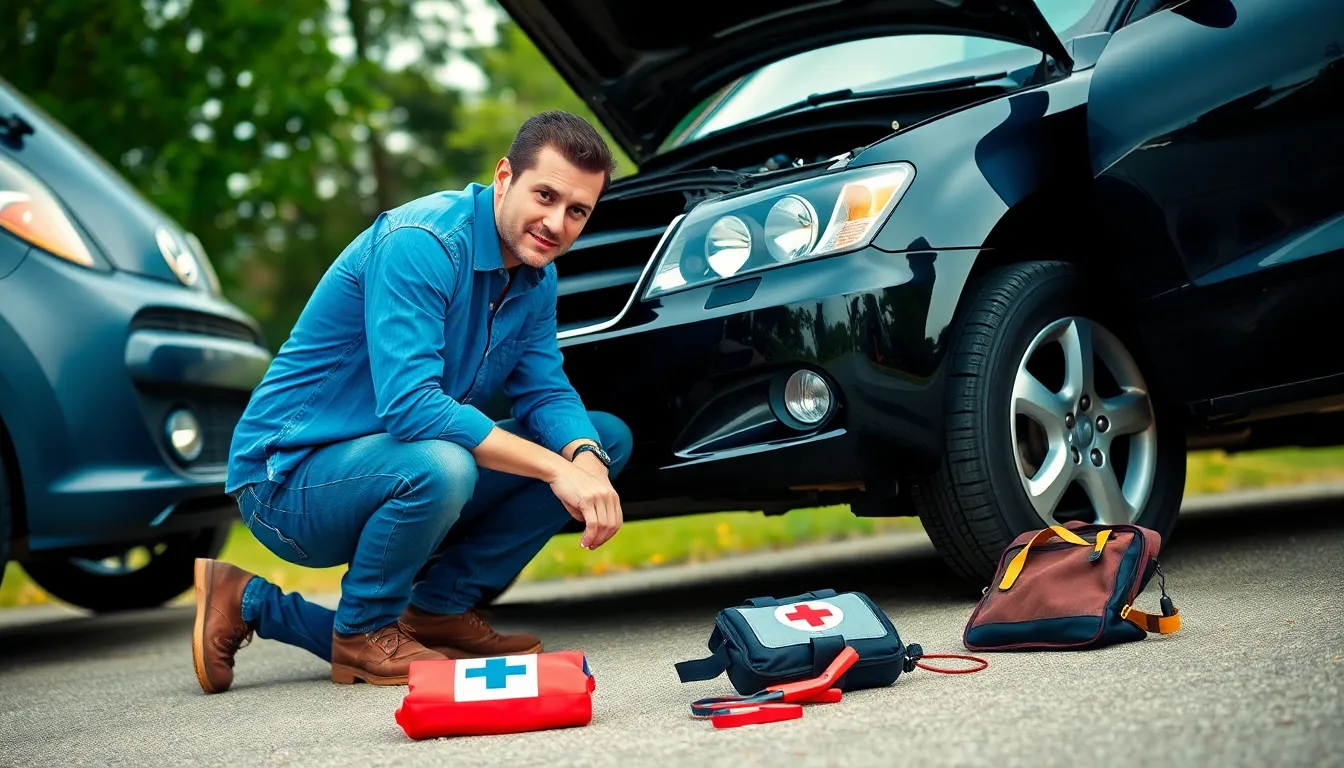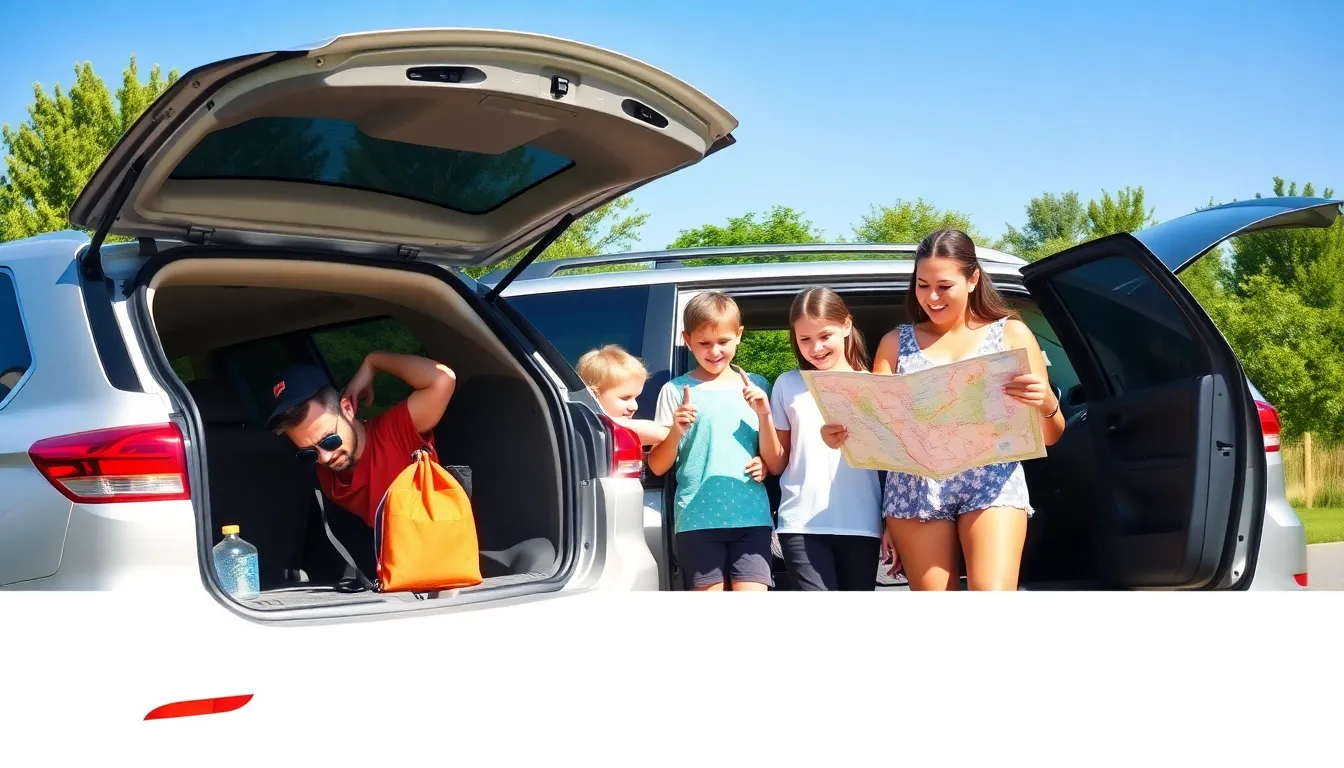Road trips can be the ultimate adventure, filled with scenic views, spontaneous stops, and the sweet sound of your favorite playlist. But before hitting the open road, it’s crucial to ensure safety is at the forefront of the journey. After all, no one wants their epic trip to turn into a real-life episode of a survival show—unless it’s a comedy, of course!
Table of Contents
ToggleImportance of Safety During Road Trips
Safety during road trips plays a critical role in ensuring a smooth and enjoyable journey. Understanding potential hazards and proactively addressing them can prevent accidents and preserve the fun of exploring new destinations.
Travelers face various road conditions, ranging from wet surfaces to construction zones. Awareness of these conditions helps in making informed decisions while driving. Statistics reveal that over 37,000 fatalities occur annually due to motor vehicle crashes in the United States. These figures underscore the need for stringent safety measures.
Preparation can significantly enhance safety. Conducting vehicle inspections helps spot mechanical issues before departure. Checking tire pressure, brakes, and fluid levels ensures the vehicle remains roadworthy. In addition, packing an emergency kit with essentials like first aid supplies and tools creates a safety net for unexpected situations.
Remaining vigilant on the road significantly lowers risks. Distracted driving poses a severe threat to safety, causing up to 39% of car accidents. Avoiding mobile devices, and adhering to speed limits, maintains focus. Continuous observation of surroundings keeps attention on potential hazards, such as pedestrians and cyclists.
Maintaining health during long journeys matters. Frequent breaks help combat fatigue and improve alertness. Staying hydrated and snacking on healthy foods fuels energy levels, ensuring that drivers remain attentive and ready for any challenges.
Ensuring passengers wear seat belts also contributes to overall safety. Seat belts reduce the risk of serious injury by 45% in the event of an accident. Establishing rules for all passengers promotes a disciplined and secure trip.
Carrying emergency contact information enhances preparedness. Sharing travel itineraries with trusted individuals ensures that someone knows the routes taken. This measure proves helpful in case of emergencies or delays.
Pre-Trip Preparations

Pre-trip preparations play a vital role in ensuring a safe road trip. Proper planning minimizes risks and enhances the overall experience.
Vehicle Inspection
Conducting a thorough vehicle inspection is essential before hitting the road. Check the tire pressure and tread depth for safety and fuel efficiency. Inspect the brakes, ensuring they function properly to avoid sudden stops. Verify that all lights are operational, including headlights and turn signals, as visibility is crucial. Additionally, examine wiper blades to ensure they provide clear visibility during rain. Engine oil and fluid levels should also be assessed, as maintaining these ensures smooth vehicle performance throughout the journey. Adhering to these steps can significantly reduce the chances of breakdowns and accidents.
Emergency Kit Essentials
An emergency kit ensures readiness for unexpected situations. Include a first-aid kit to address minor injuries, along with bottled water to stay hydrated. Flashlights with extra batteries enhance visibility during emergencies, while a multi-tool can assist in various tasks. Additionally, pack non-perishable snacks to maintain energy levels. Jumper cables provide a quick solution for battery issues, and a roadside warning triangle alerts other drivers to trouble. Having a spare tire and necessary tools enables quick fixes for flat tires. These essentials create a safety net, allowing travelers to handle unforeseen challenges effectively.
Road Trip Safety Tips
Prioritizing safety during road trips enhances the overall experience. Implementation of key safety measures can reduce risks significantly.
Buckling Up
Seat belts reduce the risk of fatal injuries by 45 percent for front-seat occupants involved in a crash. All passengers must buckle up, regardless of seating position. Ensuring that each seat belt is properly secured protects everyone in the vehicle. Children should be in appropriate car seats based on their age and size. It’s also essential to check that seat belts are functioning correctly before starting the journey. This simple step provides a crucial safeguard against unexpected incidents on the road.
Avoiding Distractions
Distractions contribute to approximately 10% of all fatal motor vehicle crashes. Maintaining focus while driving is vital for safety. Avoid using mobile devices, including texting or making calls, while behind the wheel. Setting the GPS or choosing entertainment before starting the trip helps minimize interruptions. Passengers can assist the driver by managing navigation or controlling in-car settings. Staying alert to road conditions and surroundings enhances reaction times, ensuring a safer trip for everyone involved.
Handling Emergencies on the Road
Handling emergencies during road trips requires preparedness and quick responses. Being equipped to deal with unexpected situations enhances safety and ensures smoother travels.
Roadside Assistance
Roadside assistance offers crucial support for drivers facing vehicle issues. Services typically include tire changes, fuel delivery, and towing. Many insurance companies and automobile clubs provide these services as part of their policies. It’s vital to know the exact number to call, ensuring quick access when emergencies arise. Drivers should consider signing up for a roadside assistance program before departure, providing peace of mind throughout the journey.
First Aid Procedures
First aid procedures serve as essential skills in emergency situations. A well-stocked first-aid kit enables travelers to manage minor injuries effectively. Familiarity with kit contents, including bandages, gauze, antiseptic wipes, and pain relievers, simplifies treatment. Knowing basic first aid techniques, such as CPR and how to handle burns or cuts, empowers individuals to respond confidently. Websites like the American Red Cross offer excellent resources and training for first aid, supporting better preparedness on the road.
Conclusion
Safety should always come first during road trips. By taking the necessary precautions and preparing adequately, travelers can enjoy their adventures while minimizing risks. Regular vehicle inspections and packing essential emergency supplies can make a significant difference in handling unexpected situations.
Staying alert and focused behind the wheel is crucial too. Avoiding distractions and ensuring all passengers are buckled up enhances safety for everyone. Remember that a well-planned trip not only leads to memorable experiences but also fosters peace of mind. With these practices in place, road trips can remain the joyful escapades they’re meant to be.



